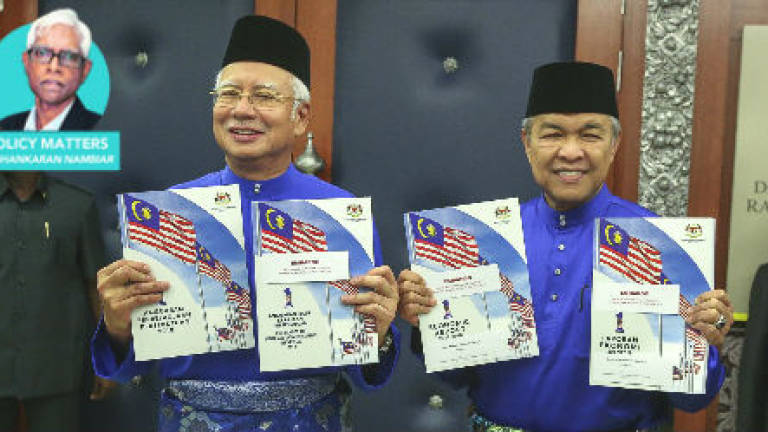A clever budget

BUDGET 2018 is a showcase of political acumen that is not completely devoid of economic sense. Two factors are at work behind the budget: better growth in 2018 and the elections that will probably be held next year.
On the back of an expected increase in GDP one can count on incomes to rise. Hence, income tax can be relied upon to be the major source of government revenue. This gives the budget the freedom to be generous, forsaking some amount of fiscal discipline for short-term political gain.
Some of the positive aspects about the budget include the emphasis on building infrastructure, targeted fiscal expenditure to support the disadvantaged, and the income tax cut. The support for entrepreneurship is also commendable.
The infrastructure development projects, especially those directed at Sabah and Sarawak are noteworthy. They make political sense (given the timing) and are worthwhile from a long-term economic perspective. What is less comprehensible is the lack of support for companies as compared to households. It has been a tough path for manufacturers over the last year, and they could have been rewarded with tax cuts to shoulder the burden of higher production costs.
Incentives for the manufacturing and services sector would perhaps have made more sense than those for the adoption of Industry 4.0. Without getting caught up in the hype that surrounds Industry 4.0, it should not be forgotten that Malaysia is still valiantly negotiating the transition from 2.0 to 3.0.
It must be added that the budget has a sprinkling of mixed and wrong signals.
Earlier the government had cut its allocation to public universities. If the signal of earlier policy measures was meant to convey the message that universities need to be innovative in raising their own funds, this has been back-tracked in this budget by awarding additional grants.
The huge dole-outs for civil servants is politically comprehensible, but not economically rational at a time when the debate is on reducing the size of the civil service, increasing their productivity, and, more generally, reducing operating expenditure. Since the civil service is a huge vote bank, one cannot count on any political party to campaign for a reduction in their size. Nevertheless, there seems to be little need to continually reward them.
Another area of inadequacy in the budget is the treatment of housing and healthcare. Housing and healthcare have, once again, received an ad hoc and short-termist treatment. It is way overdue to introduce a health financing scheme, rather than to provide selective relief for, say, dialysis.
On housing, civil servants and the armed forces are not the only groups that need affordable housing; a comprehensive plan has to be laid out for the middle- and lower-income population, as a whole. This is long overdue, and it is unfortunate that it has been postponed yet again.
We really need to be concerned about access to healthcare and greatly improved services for the average Malaysian rather than to focus on medical tourism or creating a medical speciality hub. The budget misplaces its priorities here.
The pre-occupation with appeasing as many groups as possible (on all bases: ethnic, sectoral, occupational, regional) ahead of the elections seems to have blunted the edge that could have been gained from better economic circumstances in 2018.
Even in the pre-budget announcement weeks, economists were upgrading their forecast for this year, and the next, too. In the light of this positive trend, one would be right to expect better growth in 2018. This is well and good.
Further to the already positive outlook, Budget 2018 is going to add its fillip to next year's growth rate. The impetus will come from a variety of sources. This includes the increased household income for targeted groups as well as the multiplier effects from the host of big projects (airport renovation, transport connectivity and the like). There is the possibility that inflationary tendencies might be fuelled, further affecting the middle-40, but cushioning the civil servants.
All in all, Tan Sri Irwan Siregar and his team at the Ministry of Finance have crafted a clever budget.
One would have wished that the theme of fiscal prudence be pursued in this budget, too. But then, politics is almost always the prime mover of motives.
Dr Shankaran Nambiar is author of Malaysia in Troubled Times. Comments: letters@thesundaily.com